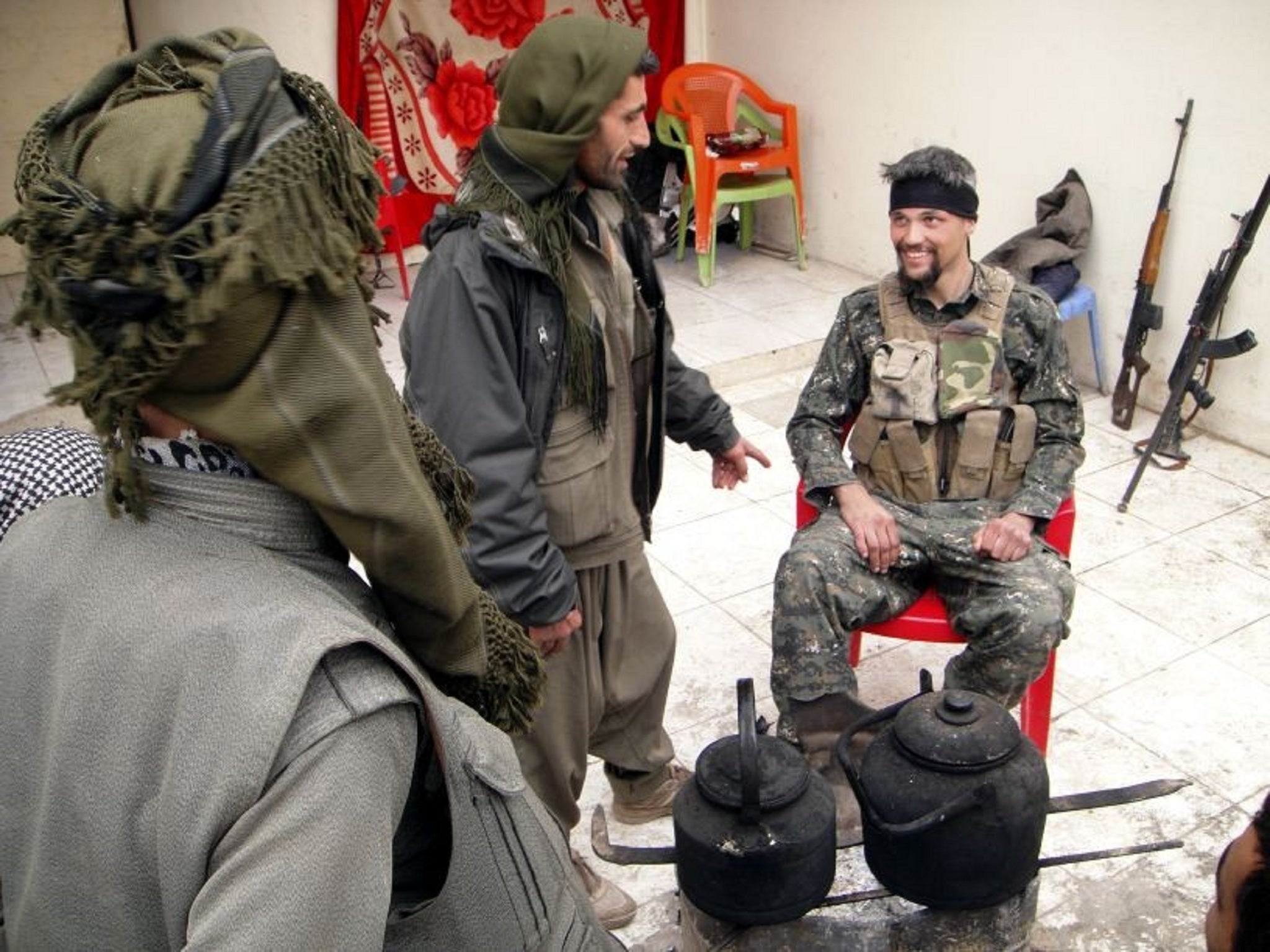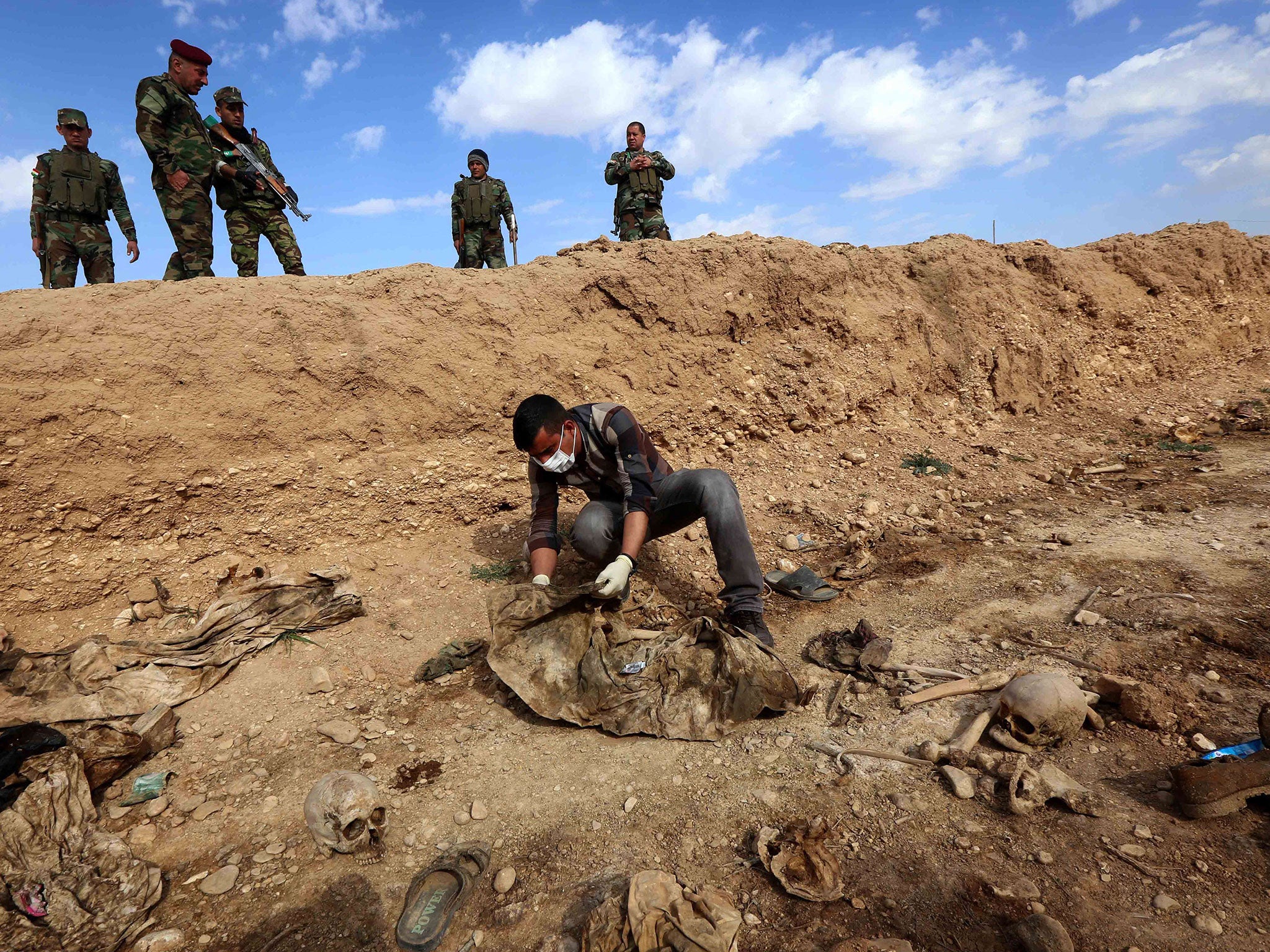Former US Army soldier with 'Christ is Lord' T-shirt fighting Isis alongside Kurdish people
Dozens of US citizens are fighting alongside the PKK due to Iraq war 'guilt'

Your support helps us to tell the story
From reproductive rights to climate change to Big Tech, The Independent is on the ground when the story is developing. Whether it's investigating the financials of Elon Musk's pro-Trump PAC or producing our latest documentary, 'The A Word', which shines a light on the American women fighting for reproductive rights, we know how important it is to parse out the facts from the messaging.
At such a critical moment in US history, we need reporters on the ground. Your donation allows us to keep sending journalists to speak to both sides of the story.
The Independent is trusted by Americans across the entire political spectrum. And unlike many other quality news outlets, we choose not to lock Americans out of our reporting and analysis with paywalls. We believe quality journalism should be available to everyone, paid for by those who can afford it.
Your support makes all the difference.As Kurdish fighters gathered around a fire in this damp, frigid mountain town in north-western Iraq, exhausted from battling the Islamic State group, a surprising recruit wearing a tactical vest with the words "Christ is Lord" scribbled on it joined them.
The fighter, with a sniper rifle slung over his shoulder and Rambo-styled bandanna around his head, is 28-year-old Jordan Matson from Sturtevant, Wisconsin, a former US Army soldier who joined the Kurds to fight the extremist group now holding a third of Iraq and neighbouring Syria.
"I'm not going back until the fight is finished and Isis is crippled," Matson told The Associated Press, using an alternate acronym for the militant group. "I decided that if my government wasn't going to do anything to help this country, especially Kurdish people who stood by us for 10 years and helped us out while we were in this country, then I was going to do something."
Matson and dozens of other Westerners now fight with the Kurds, spurred on by Kurdish social media campaigners and a sense of duty many feel after Iraq, the target of a decade-long US-led military campaign, collapsed under an Islamic State group offensive within days last summer. And while US and its coalition allies bomb the extremists from the air, Kurds say they hope more Westerners will join them on the ground to fight.
Foreigners joining other people's wars is nothing new, from the French Foreign Legion to the International Brigades of the Spanish Civil War. The Kurds, however, turned to the Internet to find its warriors, creating a Facebook page called "The Lions of Rojava" with the stated mission of sending "terrorists to hell and save humanity." The page also frequently features portraits of smiling, beautiful and heavily armed Kurdish female commanders and fighters.
Matson and three other Americans and an Australian national who spoke to the AP all said they arranged joining Kurdish forces through the Facebook page, run by the People's Protection Units, or YPG, the main Syrian Kurdish militia fighting in northern Syria and Iraq. They crossed from Turkey into Syria, now in its fourth year of civil war, before later joining a Kurdish offensive sweeping into Iraq to challenge the Islamic State group. They now are based in Sinjar, whose stone homes painted green, pink and yellow have damaged in fighting, surrounded by sandbags and piles of rubble.

Foreigners like Matson seemed drawn to helping Kurds, Yazidis and other minority ethnic groups caught up in the battle, facing possible destruction at the hand of extremists willing to massacres hundreds in propaganda videos.
"How many people were sold into slavery or killed just for being part of a different ethnic group or religion?" he said. "That's something I am willing to die to defend."
However, the other Westerners who talked to the AP spoke on condition of anonymity, fearing the reaction of their families, who didn't know where they were, or possible legal troubles if they make it back home.
So far, the US hasn't banned Americans from fighting with militias against the Islamic State group, though it considers the Turkey-based Kurdish Workers' Party, commonly known as the PKK, a terrorist organisation. The PKK has been fighting alongside the YPG in Sinjar and in the Syrian town of Kobani.
Under Australian law, it is illegal to fight with any force outside of its national army. Australia also is one of the first countries to criminalize travel to Syria's al-Raqqa province, the de facto capital of the Islamic State group.
The US Embassy in Baghdad had no immediate comment to an AP query about Americans fighting with the Kurds.
Matson and other foreigners fighting with the YPG came from Syria into Sinjar last month, which saw thousands of Yazidis flee into the surrounding mountains last year during the Islamic State group's offensive. It's unclear how many foreigners total are fighting with the YPG and other Kurdish forces, though both foreigners and Kurds say there are "dozens."

There's a clear comradery among the foreign fighters in Sinjar, most traveling in pairs around the town.
A number of YPG fighters, many of them as young as 17, joke and tease their new foreign friends, speaking to them in the local Kurdish dialect.
One fighter, 21-year-old Khalil Oysal from Syria, spends much of his time with the foreigners since he can speak English.
"We learn from them and they learn from us," said Oysal, who American and Australian fighters have nicknamed "Bucky." "They speak with us and they like to joke. They share with us many things."
Western fighters in Sinjar say there is a major drive to recruit as many foreigners as possible, especially those with military training as many of young Kurdish fighters have little or no experience. The young fighters often pick up weapons and ammunition from dead Islamic State group militants. They also have no body armour.
Fighting remains dangerous for the Westerners as well. Two of the foreign fighters said they had just returned from visiting an American fighter badly wounded in battle. They said another foreign fighter, a Dutch national, was severely wounded in battle in Syria last week.
"You need to know what you're getting in to," Matson said. "A lot of times you're going out, you're in a mud hut. ... You have bullets and a blanket, and sometimes you just have bread, but you need to hold the line."
Join our commenting forum
Join thought-provoking conversations, follow other Independent readers and see their replies
Comments